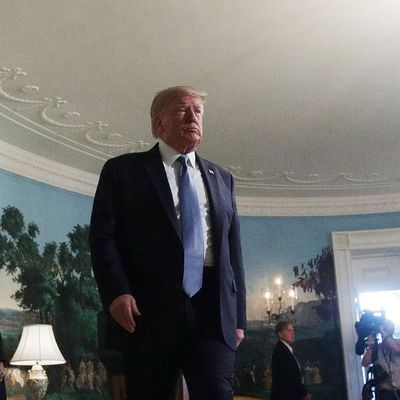
As 22 corpses grew cold after the mass shooting in El Paso, Texas, on Saturday, and then nine more, following a second shooting in Dayton, Ohio, the next morning, pressure mounted for officials to respond with meaningful gun-control legislation. What happened instead was a fitting extension of the GOP’s decades-long refusal to confront the issue head on: a Republican president offering empty platitudes while demonizing an unrelated culprit.
On Monday morning, President Trump tweeted, “We cannot let those killed in El Paso, Texas, and Dayton, Ohio, die in vain … We can never forget them, and those many who came before them. Republicans and Democrats must come together and get strong background checks, perhaps marrying this legislation with desperately needed immigration reform.” He echoed the sentiment in televised remarks, but notably omitted any specific legislative proposals. (He also referred to Dayton as “Toledo” and suggested that America incarcerate more mentally ill people.) But his initial message was clear: If a new bill lands on his desk, it will be the result of a compromise between Democrats and Republicans. That Democrats have been urging stricter gun-control measures for decades while Republicans made them impossible went unmentioned, including Senate Majority Leader Mitch McConnell’s continued refusal to vote on a universal-background-check bill that passed the House.
More explicit was the equation of shootings to immigration that underpinned Trump’s absurd proposal: that his support for gun control after the El Paso shooting was incumbent on the passage of a separate law advancing the shooter’s goals around undocumented entry. Patrick Crusius, 21, allegedly penned a manifesto before his rampage at an El Paso Walmart in which he attributed his actions to a perceived “Hispanic invasion of Texas.” The screed suggests he drove ten hours and 650 miles from Allen to El Paso — which lies across the U.S.-Mexico border from Ciudad Juárez, and boasts the largest share of Hispanics of any big city in Texas, at 82 percent — to ensure the dead included as many Hispanic people as possible. It also framed the shooting as an “incentive” to frighten Hispanics, through violence, into leaving the U.S. and deter others from migrating here. It insists that the author’s feelings on the subject predate Trump’s rise, but his reason for explicitly distancing himself is obvious: His is the same logic fueling many of the president’s immigration policies.
These policies include the forcible separation of migrant children from their parents and the incarceration of both by the thousands. To justify this practice — and its victims’ confinement to filthy border camps — Trump and his supporters have sought to magnify the threat they pose to public safety. The president has described migrant caravans as part of an invasion by violent criminals. Rare crimes committed by undocumented immigrants have prompted his administration to establish a special hotline for reporting them, and a federal agency — the Victims of Immigration Crime Engagement Office — to highlight them. Conservative media and politicians have amplified specific examples, with a special emphasis on murdered white women like Sarah Root and Mollie Tibbets. (Both women’s families have spoken out against how Republicans have politicized their deaths.) Distilling these sentiments, Representative Steve King, perhaps the party’s most virulently outspoken xenophobe over the past 15 years, has cast the deaths of Americans at the hands of undocumented immigrants as “a slow-motion Holocaust.”
All of these efforts serve to justify violence as a deterrent to immigration. This isn’t unique to Trump, nor does it necessarily encourage vigilantism — in most cases, such violence is framed as the province of the state. But there’s an undeniable perversity to his conditional interest in making it harder for white nationalists to kill nonwhite people, so long as Democrats enshrine their white nationalist goals into law. Its conditionality further suggests the comparable nature of their threats, in Trump’s assessment: Undocumented immigration is as dangerous to Americans as gun violence.
Statistically, the two aren’t close: When Representative Tom McClintock claimed that immigrants killed 1,800 people in 2017, experts quoted by PolitiFact called his claim “outrageously high,” citing the lack of reliable data and his referencing deaths that were actually spread over several years. Meanwhile, more than 14,000 people were killed in gun homicides the same year. Accounting for suicides, guns killed nearly 40,000 in 2017. There’s no evidence that an undocumented presence in a community leads to increased crime. But of course, statistics aren’t what’s at issue here. We’re talking about comparing a problem made possible by weapons that Republicans insist on making widely available to the mere presence of noncitizen Hispanics on U.S. soil. In retrospect, it was predictable which one the GOP would consider more dire. But it’s notable regardless that further restricting Hispanic entry to the U.S. is Trump’s precondition for curtailing the mass murder of Hispanics.






























